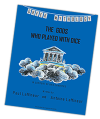The Hero and the Monster
Theseus was the son of the King of Athens Aegeus, though it was whispered that his biological father was Poseidon, God of the Sea, as supposedly his mother was possessed by Poseidon when she slept with Aegeus.
Separated from Aegeus at birth, the adult Theseus eventually learned about his royal parentage and successfully claimed his place beside his father.
The young warrior did so after surviving six labors on his way to Athens. Each labor involved him slaying a notorious villain, killing a monstrous wild boar, punishing outlaws. He was almost poisoned by Medea who had married his father before being finally acknowledged by his father.
But the joy of Theseus’ reunion with his father was to be short-lived.
Some time ago the son of Minos, the powerful king of Crete, Androgeos, had been “treacherously killed” while he was in Athens. Minos had immediately sought revenge from the Athenians and as retribution he had them send to Crete several youths every seven years for an unknown fate.
In fact to be devoured by the Minotaur, a terrifying monster, half man half bull. The young Athenians were thrown into a dark maze, full of arcades and dead ends, wandering aimlessly, until the Minotaur would find them
Unable to accept these human sacrifices Theseus volunteered to be one of the youths and promised his father that should he survive, he would return on a ship with white sails.
Into the Labyrinth
At his arrival in Crete, Theseus was sent into a secret location: the Labyrinth under the magnificent Palace of Cnossos, which was built by non less than the most famous architect of Ancient Greece Daedalus.
Here, the young prince quickly discovered the grim truth. Trapped inside an inextricable maze full of arcades and dead ends, they were to be hunted down and devoured by Minotaur, the terrifying monster, half man half bull.
The Minotaur
The Minotaur was in fact the punishment of king Minos for disrespecting Poseidon, god of the sea.
A magnificent bull had been offered by the God Poseidon to the king of Crete, Minos. This extraordinary bull therefore should have been offered in sacrifice to the mighty god but dazzled by the power of the bull, king Minos committed an outrage towards all the gods by keeping him for himself. That was unprecedented and the gods were determined to make sure that no one would ever challenge them this way ever again.
Therefore the gods punished him immediately by making his wife Parsiphae fall passionately in love with the bull and she gave birth to the Minotaur, the monstrous half man and half bull.
King Minos, mortified and shameful, asked the great architect Daedalus to build a labyrinth under the magnificent Palace of Cnossos in order to hide his living shame the Minotaur.
Even with his divine lineage and his heroic prowess, Theseus wouldn’t have survived the Minotaur, especially with the battle taking place in the confusing and confining corridors of the Labyrinth, without an unexpected help.
Ariadne’s thread
Fortunately for him, King Minos’ daughter Ariadne had fallen in love with him at first sight. Not only did Ariadne give Theseus a ball of thread to mark his path within the Labyrinth, she also smuggled a sword for him into the labyrinth. These tools would enable Theseus to find his way out of the Labyrinth and to slay the monstrous Minotaur.
After escaping the Labyrinth, Theseus fulfilled his promise to Ariadne by fleeing back to Athens with her. For reasons unclear, however, Ariadne never made it to Athens. Midway through the journey, Theseus abandoned the trustful sleeping Ariadne on the island of Naxos.
Thankfully for Ariadne, she would be rescued by the charming god Dionysus , they would married and lived happily ever after.
Fate was going to strike the young prince : was he overwhelmed by guilt for abandoning the key to his success Ariadne or overwhelmed by hubris?
In any case he forgot to change the sails on his ship.
Gazing at the ship with black sails returning from afar, the devastated King Aegeus assumed Theseus had perished. In grief, he committed suicide by throwing himself into the sea at the Cape , thus giving his name to the Aegean Sea.
Theseus succeeded to his father, becoming king of Athens, he pushed back the Amazons
army and increased the power of Athens. After his death the Athenians offered him sacrifices as an equal to the gods.
Ariadne’s thread :
Since then the expression Ariadne’s thread means to find a way to solve a problem or a puzzle.

